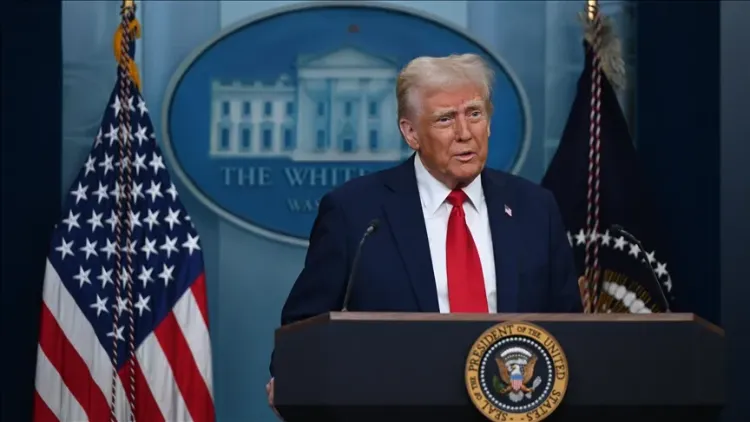Trump Asserts 'US Authority' Over Gaza During Meeting with Jordan's King

Synopsis
Key Takeaways
- Trump claims the U.S. will take control of Gaza under 'US authority.'
- He envisions development of Gaza into resorts and office spaces.
- The President is not planning to purchase the territory.
- Jordan could resettle 2,000 ill children from Gaza.
- Concerns remain over Hamas's compliance with hostages deadline.
Washington, Feb 12 (NationPress) President Donald Trump informed journalists at the White House that he is confident the US “will have Gaza,” referencing “US authority” to claim the region.
“We’re going to have it, we’re going to keep it, and we’re going to ensure that there’s going to be peace and no issues, and nobody’s going to question it, and we’re going to manage it very properly,” Trump stated during a meeting with Jordan’s King Abdullah II on Tuesday.
The President expressed his desire to see Gaza transformed into a profitable area for resorts and office buildings.
When reporters in the Oval Office pressed him about what would justify the US taking control of Gaza, Trump responded, “Under US authority.”
During the meeting, Trump dismissed the notion that the US would need to purchase the land.
“We’re not going to have to buy... we’re going to have Gaza, we don’t have to buy, there’s nothing to buy,” he said.
“It’s a war-torn area. We’re going to take it, we’re going to hold it, we’re going to cherish it, and we’re eventually going to create many jobs for the people in the Middle East. It’s going to be for the people in the Middle East, but I believe it could be a diamond.”
Trump denied any intention of personally developing real estate in Gaza and refrained from discussing his previous threats to cut US aid if Jordan and Egypt refused to resettle nearly two million Palestinians that he plans to displace under his ownership proposal.
Instead, the President shifted focus to the “good relationship” with Jordan, suggesting “I don’t have to threaten with money.”
“We contribute a significant amount of money to Jordan and to Egypt, by the way, a lot to both. But I don’t have to threaten that. I believe we’re above that,” he stated.
The President expressed confidence that Egypt and Jordan would agree to provide “a parcel of land” in each nation to resettle displaced Palestinians, saying, “We may have another solution, but I think when we complete our discussions, we’ll find a place where they’ll live very happily and safely.”
For his part, Abdullah announced that the Hashemite Kingdom would accept 2,000 children suffering from cancer or other serious health issues.
Trump stated he was unaware of this plan, calling it “fantastic” and “music to my ears,” adding he is “99 percent” certain that “we are going to work something out with Egypt.”
He also expressed doubt that Hamas would meet his Saturday deadline for Palestinian groups to release all remaining hostages in Gaza, warning of a sudden cancellation of the ceasefire agreement with Israel.
“I have a Saturday deadline, and I don’t think they’re going to make the deadline. Personally, I think they want to play tough guy, but we’ll see how tough they are. But it’s going to be a wonderful thing. It’s going to be wonderful for the Middle East,” he said.
On Monday, Hamas claimed it had fully honored its commitments under the ceasefire agreement and accused Israel of breaching four critical provisions. Earlier on Tuesday, Hamas’s armed wing, the al-Qassam Brigades, announced a postponement of the next hostage release until Israel complies with all terms of the agreement.
Trump has kept the possibility of American involvement open if the deadline is not adhered to.
This sentiment was echoed by Israeli Prime Minister Benjamin Netanyahu, who stated on Tuesday that “if Hamas does not return our hostages by noon on Saturday, the ceasefire will be terminated, and the Israeli army will resume intense fighting until Hamas is ultimately defeated.”
The three-phase ceasefire agreement has been active in Gaza since January 19, halting Israel’s indiscriminate war on the coastal enclave after over 48,000 people were killed, predominantly women and children. Much of the area has been devastated amid severe shortages of essentials caused by Israel’s restrictions on international humanitarian aid deliveries.
In the first phase of the ceasefire, which extends until early March, 33 Israeli hostages are to be freed in exchange for a number of Palestinian prisoners. The sixth Israeli-Hamas exchange was scheduled for this week.










